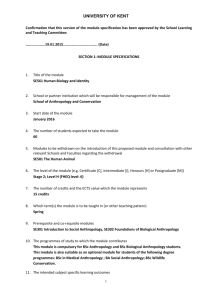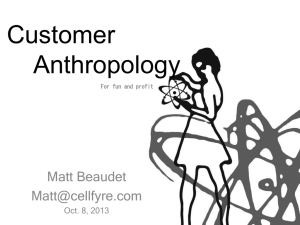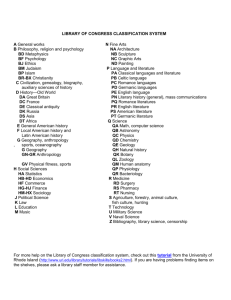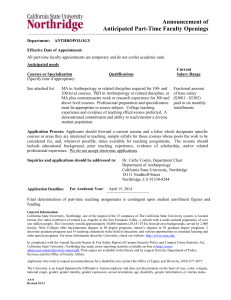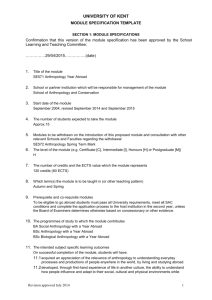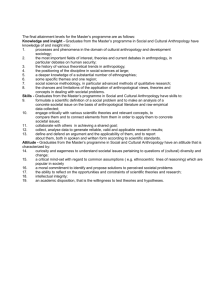BSc Anthropology - University of Kent
advertisement
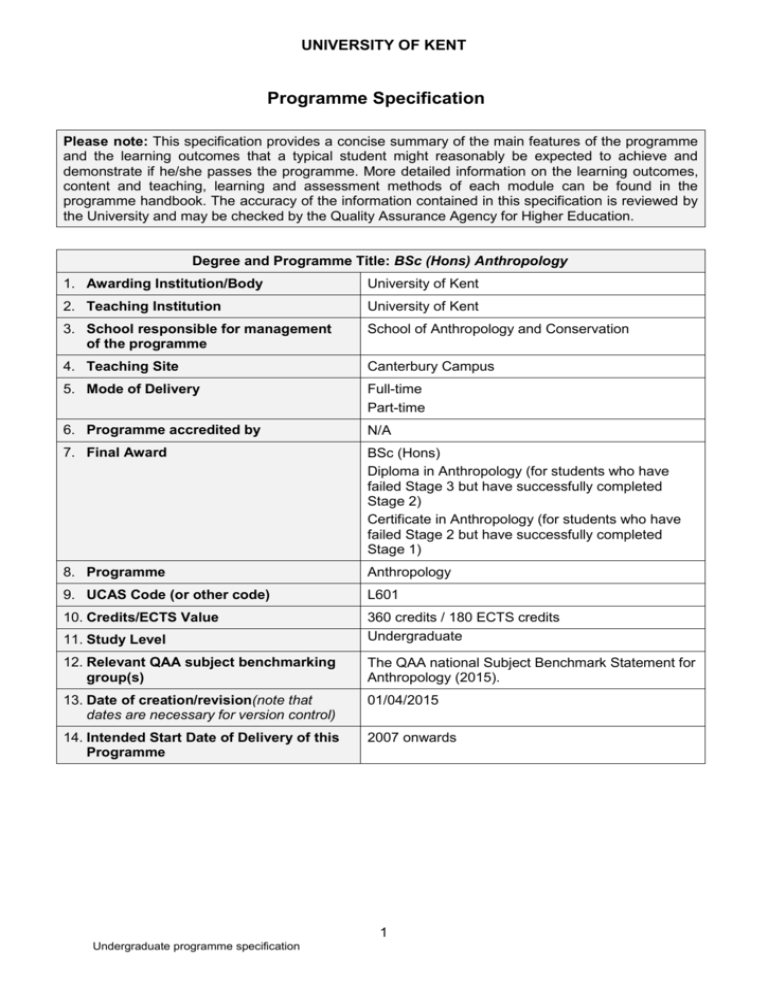
UNIVERSITY OF KENT Programme Specification Please note: This specification provides a concise summary of the main features of the programme and the learning outcomes that a typical student might reasonably be expected to achieve and demonstrate if he/she passes the programme. More detailed information on the learning outcomes, content and teaching, learning and assessment methods of each module can be found in the programme handbook. The accuracy of the information contained in this specification is reviewed by the University and may be checked by the Quality Assurance Agency for Higher Education. Degree and Programme Title: BSc (Hons) Anthropology 1. Awarding Institution/Body University of Kent 2. Teaching Institution University of Kent 3. School responsible for management of the programme School of Anthropology and Conservation 4. Teaching Site Canterbury Campus 5. Mode of Delivery Full-time Part-time 6. Programme accredited by N/A 7. Final Award BSc (Hons) Diploma in Anthropology (for students who have failed Stage 3 but have successfully completed Stage 2) Certificate in Anthropology (for students who have failed Stage 2 but have successfully completed Stage 1) 8. Programme Anthropology 9. UCAS Code (or other code) L601 10. Credits/ECTS Value 11. Study Level 360 credits / 180 ECTS credits Undergraduate 12. Relevant QAA subject benchmarking group(s) The QAA national Subject Benchmark Statement for Anthropology (2015). 13. Date of creation/revision(note that dates are necessary for version control) 01/04/2015 14. Intended Start Date of Delivery of this Programme 2007 onwards 1 Undergraduate programme specification UNIVERSITY OF KENT 15. Educational Aims of the Programme The programme aims to: 1. Prepare graduates for employment and/or further study in their chosen careers through developing students’ transferable skills.(SB4.3, 7.4) 2. Develop the critical and analytical powers of the student with respect to biological and social anthropology. (SB 1.5, 3.4, 4.3) 3. Develop critical, analytical problem-based learning skills. (SB 4.2, 4.3, 6.3) 4. Provide the student with the skills to adapt and respond positively to changes in the discipline. (SB3.5, 3.6, 4.1, 4.2) 5. Acquaint students with theoretical and methodological issues relevant to understanding anthropology. (SB 4.1, 4.2, 6.1, 6.2) 6. Demonstrate to students the relevance of anthropological knowledge to an understanding of a variety of local, national and international biological and social phenomena arising from the changing nature of human organisation both in the distant past and in the contemporary world. (SB 4.1, 4.2, 6.1, 6.2) 7. Provide students with a broad range of knowledge in the discipline of anthropology, stressing the need for a biological approach to the subject, and showing how it is closely linked to other academic disciplines. (SB 4.1, 4.2, 6.1, 6.2) 8. Provide a grounding in human and primate biological variation and make explicit the links between biological and sociocultural processes. (SB 3.6) 9. Facilitate the educational experience of students through the provision of appropriate pedagogical opportunities for learning. (SB 5.1, 5.2, 5.3, 5.4, 5.5, 5.6, 5.7) 10. Ensure that the research of School staff informs the design of modules, and their content and delivery in a manner that is efficient and reliable, and enjoyable to students. (SB 3.2, 3.4 5.4, 5.5) 16 Programme Outcomes The programme provides opportunities for students to develop and demonstrate knowledge and understanding, qualities, skills and other attributes in the following areas. A. Knowledge and Understanding of: (i.e. subject-specific knowledge and understanding) 1. Principles relevant to the study of human biology, evolution and sociality. (SB 3.4, 3.5, 3.6, 6.2) 2. Human diversity and an appreciation of its scope (SB 3.4.6.1, 6.2) 3. The fossil evidence of human evolution (SB 3.6) 4. Similarities and differences between humans and other primates (SB 3.5, 3.6) 1. 5.. Biological perspectives on human ecology (SB 3.6, 6.2) 5. The ethical implications of human biological diversity (SB 3.7, 6.3) 6. The principles of Mendelian and population genetics, as well as molecular biology (SB3.4, 3.6) 7. The relevance of anthropology to understanding everyday processes of social life anywhere in the world. (SB6.1, 6.2) 8. Social anthropology as the comparative study of human societies (SB 3.5) 9. Specific themes in social anthropology e.g. religion, politics, kinship and religion (SB 2.4, 2.6, 3.4) 10. Several ethnographic regions of the world. (SB 3.5, 4.1) Teaching/learning and assessment methods and strategies used to enable outcomes to be achieved and demonstrated Acquisition of Programme Learning Outcomes is through a combination of lectures, seminars, laboratory classes and field trips (SB 5.4, 5.5, 5.6). Compulsory modules provide a thorough grounding in core themes within biological and social anthropology. At Stage 2, the compulsory 2 Undergraduate programme specification UNIVERSITY OF KENT methodology module prepares students with the analytical and statistical skills needed to pursue the independent research module at Stage 3. A broad range of optional modules in biological and social anthropology provide students with the opportunity to develop their knowledge and understanding of anthropology in a holistic way. Assessment at all stages is via a combination of assessed coursework, unseen written examinations and project work. Coursework assessments are very varied and include analytical essays, poster presentations, verbal presentations, research theses, laboratory reports and portfolios. Progress is monitored throughout the year through a combination of assessed coursework and discussions with academic staff. Skills and Other Attributes. B. Intellectual Skills: 1. Learning and study skills; (SB 4.3) 2. The capacity to express one's own ideas in writing, to summarise the arguments of others, and to distinguish between the two; (SB 4.3) 3. Independence of thought and analytical, critical and synoptic skills; (SB 4.3) 4. Scholarly skills, such as ability to make a structured argument, reference the works of others, and assess historical evidence; (SB 4.3) 5. Academic skills, such as ability to make a structured argument, reference the works of others, and assess historical evidence; (SB 4.3) Teaching/learning and assessment methods and strategies used to enable outcomes to be achieved and demonstrated The attainment of these skills and their assessment are achieved through the content and delivery of all the programme modules in which students will be specifically directed to all these matters in the course of lectures, seminars and classroom work in general. Written assignments, project work and oral work in seminars are specifically designed to inculcate and enhance intellectual skills over the whole period of the programme. C. Subject-specific and generic skills 1. Ability to describe and analyse aspects of biological diversity; (SB 4.2) 2. Ability to identify the relationship between environmental and cultural influences in human ecology (SB 4.1) 3. Ability to design implement a project involving data collection in the field of scientific anthropology (SB 4.2) 4. Understanding of the processes involved in the development of human variation, including a working knowledge of the principles of classical genetics and molecular biology (SB 4.2) 5. A general knowledge of human biology, and an appreciation of how biological processes interact with behaviour and culture in humans (SB 4.2) 6. Ability to compare and contrast the morphology and behaviour of humans to that of other animals, specifically primates (SB 4.2) 7. Ability to understand how people are shaped by and interact with their social, cultural and physical environments while nonetheless possessing a capacity for individual agency which can allow them to transcend environmental constraints (SB 4.1) 3 Undergraduate programme specification UNIVERSITY OF KENT 8. Ability to understand how people are shaped by and interact with their social, cultural and physical environments while nonetheless possessing a capacity for individual agency which can allow them to transcend environmental constraints (SB 4.1) 9. An openness to trying to make rational sense of cultural and social phenomena and the ways in which these impact upon the interpretation of others(SB 4.1) Teaching/learning and assessment methods and strategies used to enable outcomes to be achieved and demonstrated Specific modules deal with major concepts in biological and social anthropology, facilitating the acquisition of all subject-specific skills listed. In addition, we encourage students to make intellectual links between the biological and social phenomena about which they are learning, in the course of their reflective learning, reading and writing. D. Transferable Skills: 1. Ability to make a structure argument, and reference the work of others (SB 4.3) 2. Time planning and management skills (SB 4.3) 3. Familiarity with working with equipment in a scientific laboratory 4. Communication and presentation skills (using oral and written materials and information technology (SB 4.3) 5. Ability to engage in constructive discussion in group situations and group work skills (SB 4.3) 6. The capacity to express their own ideas orally, visually and in writing, to summarise the arguments of others, and to distinguish between the two 7. Organisation of poster and PowerPoint presentations 8. Statistical and computing techniques (SB 4.3) Teaching/learning and assessment methods and strategies used to enable outcomes to be achieved and demonstrated Not assessed independently, all are outcomes of programme specific skills All modules require the acquisition of one or more of these skills and instruction and feedback are provided to students in relation to their learning and performance. The School is especially strong on assisting students in acquiring IT skills. Group work and communication skills are particularly encouraged in small seminar groups where students are expected to share ideas and discuss arguments and critical positions, working sometimes in small groups and sometimes being required to make responses as individuals. For more information on the skills developed by individual modules and on the specific learning outcomes associated with any Certificate, Diploma or BA/BSc non-honours awards relating to this programme of study, see the module mapping. 4 Undergraduate programme specification UNIVERSITY OF KENT 17 Programme Structures and Requirements, Levels, Modules, Credits and Awards This programme is studied over three years full-time or six years part-time. Study on the programme is divided into a number of modules. Single-weighted modules carry 15 credits and double-weighted modules 30 credits. One credit corresponds to approximately 10 hours of ‘learning time,’ which includes taught and supervised classes and all independent study and research. For full-time students each stage represents an academic year of study. The programme is divided into three stages each comprising 120 credits equivalent to 1,200 hours of overall learning time. Students will normally take modules equivalent to 60 credits in both terms 1 and 2 and are expected to divide their weekly workload evenly between all modules. Students must achieve specified requirements before being permitted to proceed to the next stage. For further information on modules and credits refer to the Credit Framework at http://www.kent.ac.uk/teaching/qa/credit-framework/creditinfo.html Each module and programme is designed to be at a specific level. For the descriptors of each of these levels, refer to Annex 2 of the Credit Framework at http://www.kent.ac.uk/teaching/qa/creditframework/creditinfoannex2.html. To be eligible for the award of an honours degree, students normally have to obtain 360 credits, at least 210 of which must be Level I or above, and at least 90 of which must be level H or above. Students successfully completing Stage 1 of the programme and meeting credit framework requirements who do not successfully complete Stage 2 will be eligible for the award of the Certificate in Biological Anthropology. Students successfully completing Stage 1 and Stage 2 of the programme and meeting Credit Framework requirements who do not successfully complete Stage 3 will be eligible for the award of the Diploma in Biological Anthropology. Students successfully completing Stage 2 of the programme and achieving 300 credits overall including at least 60 credits at level H or above in Stage 3 and meeting Credit Framework requirements will be eligible for the award of a BSc non-honours degree. Compulsory modules are core to the programme and must be taken by all students studying the programme. Optional modules provide a choice of subject areas, from which students will select a stated number of modules. When choosing modules in Stages 2 and 3, students should take heed of any pre-requisite or corequisite modules. Where a student fails a module(s) due to illness or other mitigating circumstances, such failure may be condoned, subject to the requirements of the Credit Framework and provided that the student has achieved the programme learning outcomes. For further information refer to the Credit Framework at http://www.kent.ac.uk/teaching/qa/credit-framework/creditinfo.html. Where a student fails a module(s), but has marks for such modules within 10 percentage points of the pass mark, the Board of Examiners may nevertheless award the credits for the module(s), subject to the requirements of the Credit Framework and provided that the student has achieved the programme learning outcomes. Modules in which failure will not be condoned or compensated include: * Note: all asterisked modules in the modules table below cannot be compensated, condoned or trailed 5 Undergraduate programme specification UNIVERSITY OF KENT Code Title Level Credits Term(s) Stage 1 Compulsory Modules SE301* Introduction to Social Anthropology C 30 1+2 SE302* Foundations of Biological Anthropology C 30 1+2 SE307* Thinkers and Theories: An Introduction to C 15 2 the History and Development of Anthropology SE308 Skills for Anthropology and Conservation C 15 1 Optional Modules Students must select 30 credits from the following or from the Wild Module list for Stage 1: SE306 Animals, People and Plants C 15 2 SE309 Violence and Conflict in the Contemporary C 15 1+2 World BI305 Fundamental Human Biology C 15 1+2 BI307 Human Physiology and Disease C 15 1+2 Stage 2 Compulsory Modules SE567* Methodology in Anthropological Science H 15 2 SE561* Biology and Human Identity H 15 2 SE582* Comparative Perspectives in Primate H 15 1 Biology SE588* Advanced Social Anthropology I H 15 1 SE589* Advanced Social Anthropology II H 15 2 Optional Modules Students must select a minimum of 30 credits or up to 45 credits from the following (NB: Honour students must have acquired at least 45 credits from stage 2 or stage 3 modules marked with an asterisk beside module title (*)): SE565 Sex Evolution and Human Nature* H 15 1 SE566 Human Osteology* H 15 1 SE580 Primate Behaviour and Ecology* H 15 2 DI503 Evolutionary Genetics and Conservation H 15 2 SE542 Human Ecology H 15 2 SE547 Southeast Asian Societies H 15 1 SE549 The Anthropology of Health, Illness and H 15 2 Medicine SE550 Anthropology of Gender H 15 2 SE551 Anthropology and Language H 15 1 SE552 Culture and Cognition H 15 2 SE554 Visual Anthropology Theory H 15 1 SE555 Project in Visual Anthropology H 15 2 SE568 History of Evolutionary Thought H 15 1 SE556 Social Sciences in the Classroom H 15 2 SE557 Primate Communication H 15 2 SE569 Palaeopathology H 15 1 SE573 Ethnicity and Nationalism H 15 1 SE575 Medicinal Plants, Traditional Healing, and H 15 1 Drug Discovery SE579 The Anthropology of Amazonia H 15 2 SE584 The Anthropology of Business H 15 2 6 Undergraduate programme specification UNIVERSITY OF KENT SE585 Anthropology of Eating: From the Raw to H 15 1 the Cooked SE592 The Ethnography of Central Asian Societies H 15 1 SE594 Anthropology and Development H 15 1 SE595 Social Computing H 15 2 SE601 European Societies H 15 2 SE604 Human Behavioural Ecology H 15 2 SE605 Hormones and Behaviour H 15 1 SE752 Anthropology of Creativity H 15 2 Where only 30 credits have been chosen from the above list, students must select 15 credits of wild modules upon approval of the Programme Convenor. Stage 3 Compulsory Module SE533* Project in Anthropological Science H 30 1+2 Optional Modules Students must select a minimum of 60 credits or up to 90 credits from the following (NB: Honour students must have acquired at least 45 credits from stage 2 or stage 3 modules marked with an asterisk beside module title (*)): H 15 2 SE541 Paleoanthropology* Current Issues in Evolutionary Anthropology* Evolution of Human Diversity* H 15 2 H 15 1 H H H 15 15 15 2 1 2 H H H H H H H H 15 15 15 15 15 15 15 15 2 1 2 1 2 1 2 2 H H H 15 15 15 1 1 1 H H H 15 15 15 2 2 1 SE592 SE594 SE595 SE601 SE604 SE605 Human Ecology Southeast Asian Societies The Anthropology of Health, Illness and Medicine Anthropology of Gender Anthropology and Language Culture and Cognition Visual Anthropology Theory Project in Visual Anthropology History of Evolutionary Thought Social Sciences in the Classroom Primate Communication Paleopathology Ethnicity and Nationalism Medicinal Plants, Traditional Healing, and Drug Discovery The Anthropology of Amazonia The Anthropology of Business Anthropology of Eating: From the Raw to the Cooked The Ethnography of Central Asian Societies Anthropology and Development Social Computing European Societies Human Behavioural Ecology Hormones and Behaviour H H H H H H 15 15 15 15 15 15 1 1 2 2 2 1 SE752 Anthropology of Creativity H 15 2 SE570 SE593 SE542 SE547 SE549 SE550 SE551 SE552 SE554 SE555 SE568 SE556 SE557 SE569 SE573 SE575 SE579 SE584 SE585 7 Undergraduate programme specification UNIVERSITY OF KENT Where only 60 credits have been chosen from the above list, students must select a further 30 credits of wild modules upon approval of the Programme Convenor. 18 Work-Based Learning Disability Statement: Where disabled students are due to undertake a work placement as part of this programme of study, a representative of the University will meet with the work placement provider in advance to ensure the provision of anticipatory and reasonable adjustments in line with legal requirements. Where relevant to the programme of study, provide details of any work-based learning element, inclusive of employer details, delivery, assessment and support for students: Not applicable 19 Support for Students and their Learning Students are provided with introductory information including access to handbooks outlining programmes of study within the School and the Faculty as well as general university information outlining the students' charter and describing the facilities available on campus. All first year students are enrolled in an academic skills module (SE308) which covers topics such as plagiarism, good practice in writing essays and effective exam preparation. The School has its own computer room equipped with computers for student use. These are in addition to the computers available for the general use of students in common areas such as the library. One member of staff is a technical officer responsible for IT provision within the School and has special responsibility for assisting students with IT related problems. The technical officer also offers support in statistics. For the purposes of students doing the modules in visual anthropology, there is a range of recording equipment to which they have access and in which the use of which they are given instruction. There is also a small library of anthropological videos and CDs which students are encouraged to use. There is also a biology teaching laboratory. This lab has a range of specialist equipment for use in biological and anthropological science teaching, including equipment for use in anthropometry and morphometrics, basic molecular biology equipment, skeletal material and a first rate collection of fossil primate and human casts, heart rate monitors, and microscopes. These pieces of equipment are used in taught practical sessions and are also available for use by students for individual projects. All members of staff keep special office hours during the week for any students who wish to consult them. In addition students are from their initial registration in the first year all assigned to individual members of staff who act as their tutors throughout their time at the university. The role of the tutor is to provide advice on matters ranging from the choice of modules that students should take and general academic guidance to personal support in pointing students in the direction of services which the university can offer the individual. Other support services include: School and University induction programme Programme/module handbooks Library services, see http://www.kent.ac.uk/library/ Student Support http://www.kent.ac.uk/studentsupport/ Student Wellbeing www.kent.ac.uk/studentwellbeing/ Centre for English and World Languages, see http://www.kent.ac.uk/cewl/index.html Student Learning Advisory Service, see http://www.kent.ac.uk/uelt/about/slas.html 8 Undergraduate programme specification UNIVERSITY OF KENT PASS system, see https://www.kent.ac.uk/uelt/quality/code2001/annexg.html Academic Adviser system Kent Union, see www.kentunion.co.uk/ Careers and Employability Services, see www.kent.ac.uk/ces/ Counselling Service www.kent.ac.uk/counselling/ Information Services (computing and library services), see www.kent.ac.uk/is/ Medical Centre, see www.kent.ac.uk/counselling/menu/Medical-Centre.html Undergraduate student representation at School, Faculty and Institutional levels International Development Office, see www.kent.ac.uk/international/ 20 Entry Profile The minimum age to study a degree programme at the university is normally at least 17 years old by 20 September in the year the programme begins. There is no upper age limit. 20.1 Entry Route For fuller information, please refer to the University prospectus Standard offer of 340 UCAS points at A-level (AAB) with flexible offers down to 300 points at Alevel (BBB) OR international equivalent OR satisfactory pass in an approved Foundation or Access programme. A-Level Sciences (Biology preferred) or Psychology (B or better).International Baccalaureate (IB) 33 points with 17 at Higher level. BTEC national diploma – 3 Distinctions In order to enter directly onto a degree programme foreign students will also need to demonstrate a proficiency in English. IELTs requirements for international applicants: Average 6.5 in IELTs test, minimum 6.0 in reading and writing. 20.2What does this programme have to offer? Anthropology draws upon and connects with other disciplines within the social and life sciences. Major, well-defined areas of study include human evolution, behaviour and ecology, skeletal biology, primatology, kinship, religion, politics, and economics. The programme offers a unique opportunity to study a comprehensive range of subjects across anthropology that will prepare students for a variety of careers in related and unrelated fields. 20.3 Personal Profile State what the typical applicant might be expected to demonstrate at the commencement of his/her studies. An interest in human behaviour, society and biology. A willingness to engage in informed debate about current and often controversial issues relating to all spheres of humanity, including evolution, diversity, society and social systems. Suitable levels of numeracy and/or a willingness to develop them. A commitment to develop the critical thinking and analytical skills required to address real-life problems. 21 Methods for Evaluating and Enhancing the Quality and Standards of Teaching and Learning 21.1 Mechanisms for review and evaluation of teaching, learning, assessment, the curriculum and outcome standards Student module evaluations 9 Undergraduate programme specification UNIVERSITY OF KENT Annual programme and module monitoring reports, see http://www.kent.ac.uk/teaching/qa/codes/taught/annexe.html External Examiners system, see http://www.kent.ac.uk/teaching/qa/codes/taught/annexk.html Periodic programme review, http://www.kent.ac.uk/teaching/qa/codes/taught/annexf.html Annual staff appraisal Peer observation Quality Assurance Framework, http://www.kent.ac.uk/teaching/qa/codes/index.html QAA Higher Education Review, see http://www.qaa.ac.uk/InstitutionReports/types-ofreview/higher-education-review/Pages/default.aspx Matters of teaching and learning are also regularly the subject of formal and informal meetings among members of staff who often teach jointly together and attend each other's lecture and seminars. Individual members of staff sit on national committees that discuss the teaching and learning of anthropology and report back on discussions to their colleagues. Members of staff are actively involved in preparing readings and textbooks for the teaching of their subject nationally and internationally. 21.2 Committees with responsibility for monitoring and evaluating quality and standards Staff-Student Liaison Committee School Learning and Teaching Committee Faculty Learning and Teaching Committee Faculty Board Learning and Teaching Board Board of Examiners 21.3 Mechanisms for gaining student feedback on the quality of teaching and their learning experience Student module evaluations Staff-Student Liaison Committee Student rep system (School, Faculty and Institutional level) Annual NSS 21.4 Staff Development priorities include: PGCHE requirements HEA (associate) fellowship membership Annual appraisals Institutional Level Staff Development Programme Academic Practice Provision (PGCHE, ATAP and other development opportunities) Professional body membership and requirements Programme team meetings Research seminars Conferences Study leave 22 Indicators of Quality and Standards Our School is internationally recognised by anthropologists, including those working in biological 10 Undergraduate programme specification UNIVERSITY OF KENT anthropology, social anthropology, ethnobiology and additional sub-fields (e.g. primatology, palaeoanthropology etc). Members of staff teaching on the programme have active research programmes, resulting in regular published outputs. Staff are active in developing collaborative research links with academics at a wider national and international level. Teaching Quality Assessment: Excellent. Research Assessment Exercise: 5. Members of staff regularly sit on national anthropology committees and are frequently asked to be external examiners for departments of anthropology nationally and internationally. Results of periodic programme review (2012) QAA Higher Education Review 2008 & 2015 Annual External Examiner reports Annual programme and module monitoring reports 22.1The following reference points were used in creating these specifications: QAA UK Quality Code for Higher Education QAA Benchmarking statement/s for Anthropology (February 2015) School and Faculty plan University Plan/Learning and Teaching Strategy Staff research activities Template last updated October 2014 11 Undergraduate programme specification

